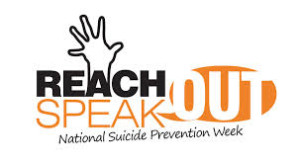
This week, Sept. 8-14, 2014, marks National Suicide Prevention Week. Each year, leading organizations on the topic are able to use this week as a platform to inform and remind survivors or those who may be worried about a loved one of warnings signs or measures they can take to help save lives.
National Suicide Prevention Week comes at an interesting time this year. Having just experienced the loss of  Robin Williams, suicide (and prevention) permeated mainstream news coverage for about a week. I felt hopeful that the topic might continue to be discussed or that major initiatives might be announced by the President to make it easier and more acceptable for people to get help. I wondered why there wasn’t a televised, awareness-driving program or fundraiser following Mr. Williams’ death. What I did learn is that NBC declined to air a suicide prevention PSA following his memorial tribute at the Emmys because “they preferred to focus on his life and not the way he died.”
Robin Williams, suicide (and prevention) permeated mainstream news coverage for about a week. I felt hopeful that the topic might continue to be discussed or that major initiatives might be announced by the President to make it easier and more acceptable for people to get help. I wondered why there wasn’t a televised, awareness-driving program or fundraiser following Mr. Williams’ death. What I did learn is that NBC declined to air a suicide prevention PSA following his memorial tribute at the Emmys because “they preferred to focus on his life and not the way he died.”
I don’t know exactly what I was expecting to see in this aftermath – maybe something big and proactive along the lines of the ALS ice bucket challenge that is sweeping the internet. We lost a very close family friend to ALS recently and it was so sad to see how this awful disease slowly robbed her of her outward personality and ability to continue living. It was nice that this viral challenge helped to educate so many people about ALS and also generate millions of dollars toward research and patient care. And, all it took was one person to get the ball rolling with these videos and donations in a compelling way. As a PR practitioner, I began to wonder what our ice bucket challenge could or should be. People suffering from anxiety, depression, bipolar disorder and other mental health issues face a similar inward loss of their personality and desire to live. This weekend, there was also the televised and celebrity-studded “Stand Up to Cancer” fundraiser. Having lost two grandparents to cancer, I am also thankful for the support this cause generated. Every morning, I walk out my front door to see a billboard educating people on the warning signs for stroke. There just seems to be so much ongoing conversation about more familiar topics.
Suicide takes many, many more lives than other diseases that get more awareness and support. It’s also the one death I’ve experienced in which the sadness and baggage has lasted the longest. I feel nearly the same level of grief about the loss of my dad today as I did when he died three years ago. We need help reducing the stigma for survivors and also the stigma for those afraid or unable to get help, but I don’t know what it’s going to take! We can all continue to do our work and hopefully the strength will come in numbers until something bigger happens.
one death I’ve experienced in which the sadness and baggage has lasted the longest. I feel nearly the same level of grief about the loss of my dad today as I did when he died three years ago. We need help reducing the stigma for survivors and also the stigma for those afraid or unable to get help, but I don’t know what it’s going to take! We can all continue to do our work and hopefully the strength will come in numbers until something bigger happens.
National Suicide Prevention Week 2014 Resources
As part of my “work” and contributions this week, I wanted to share some posts that may help survivors:
- My post on National Suicide Prevention Week 2013, which includes tips and warning signs from the American Foundation for Suicide Prevention
- A post from the Alliance of Hope for Survivors of Suicide blog that may help to reduce survivor grief, entitled “Is Suicide 100% Preventable?”
- “…is suicide 100% preventable? Probably not. There are times when love and intervention make a world of difference. And there are times when it doesn’t. One member of our community summed it up best: “Honestly No … (it is not 100% preventable but) … this doesn’t mean we should give up trying to help people – it just means we really should stop letting ourselves feel so guilty for something that isn’t our fault.”
- Tips and ideas from the American Association of Suicidology on how to mark this week
Be well, everyone!



